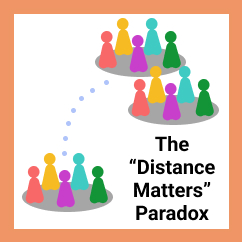|
|||||
| By identifying the socio-technical conditions required for teams to work effectively remotely, the Distance Matters framework has been influential in CSCW since its introduction in 2000. Advances in collaboration technology and practices have since brought teams increasingly closer to achieving these conditions. This paper presents a ten-month ethnography in a remote organization, where we observed that despite exhibiting excellent remote collaboration, teams paradoxically struggled to collaborate across team boundaries. We extend the Distance Matters framework to account for inter-team collaboration, arguing that challenges analogous to those in the original intra-team framework — common ground, collaboration readiness, collaboration technology readiness, and coupling of work — persist but are actualized differently at the inter-team scale. Finally, we identify a fundamental tension between the intra- and inter-team layers: the collaboration technology and practices that help individual teams thrive (e.g., adopting customized collaboration software) can also prompt collaboration challenges in the inter-team layer, and conversely the technology and practices that facilitate inter-team collaboration (e.g., strong centralized IT organizations) can harm practices at the intra-team layer. The addition of the inter-team layer to the Distance Matters framework opens new opportunities for CSCW, where balancing the tension between team and organizational collaboration needs will be a critical technological, operational, and organizational challenge for remote work in the coming decades. |
|||||
